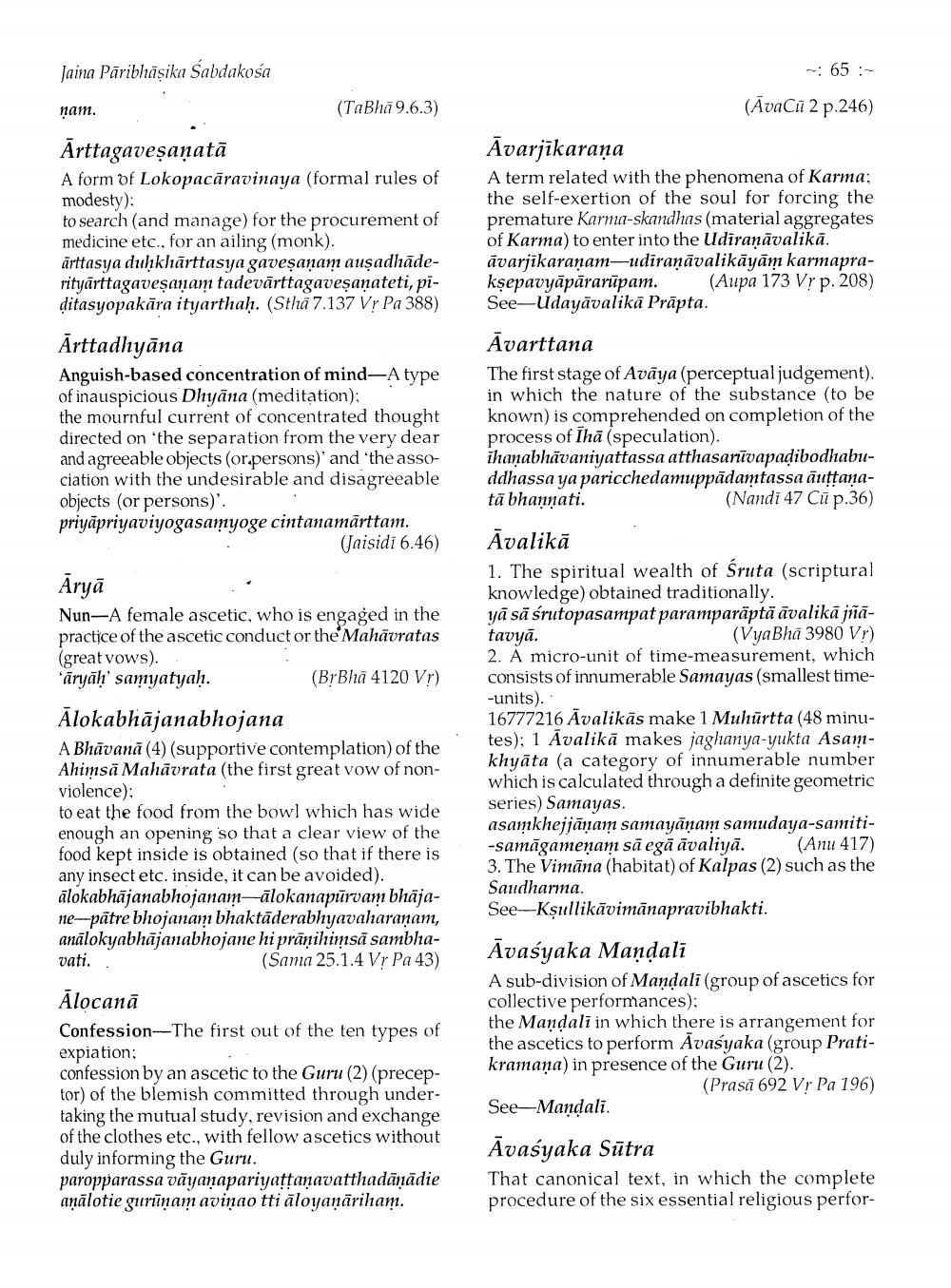________________
Jaina Pāribhāşika Sabdakosa
65 :
пат.
(Ta Bhā 9.6.3)
(ĀvaCü 2 p.246)
Arttagavesaņatā A form of Lokopacāravinaya (formal rules of modesty): to search (and manage) for the procurement of medicine etc., for an ailing (monk). ārttasya duḥkhārttasya gaveṣaṇam ausadhāderityārttagaveşanam tadevārttagavesanateti, piditasyopakāra ityarthah. (Sthā 7.137 Vr Pa 388)
Avarjīkaraņa A term related with the phenomena of Karma; the self-exertion of the soul for forcing the premature Karma-skandhas (material aggregates of Karma) to enter into the Udiraṇāvalikā. āvarjikaraṇam-udiraņāvalikāyām karmaprakşepavyāpārarūpam. (Aupa 173 Vr p. 208) See-Udayāvalikā Prāpta.
Arttadhyāna Anguish-based concentration of mind-A type of inauspicious Dhyāna (meditation); the mournful current of concentrated thought directed on the separation from the very dear and agreeable objects (or persons)' and 'the association with the undesirable and disagreeable objects (or persons)'. priyāpriyaviyogasamyoge cintanamārttam.
(Jaisidi 6.46)
Avarttana The first stage of Avāya (perceptual judgement). in which the nature of the substance (to be known) is comprehended on completion of the process of Ihā (speculation). ihanabhāvaniyattassa atthasarūvapadibodhabuddhassa ya paricchedamuppādamtassa auttaņatā bhannati.
(Nandi 47 Cū p.36)
Aryā Nun--A female ascetic, who is engaged in the practice of the ascetic conduct or the Mahävratas (great vows). 'āryāḥ samyatyaḥ.
(Br Bhā 4120 Vr)
Alokabhājanabhojana A Bhāvanā (4) (supportive contemplation) of the Ahimsä Mahāvrata (the first great vow of nonviolence): to eat the food from the bowl which has wide enough an opening so that a clear view of the food kept inside is obtained (so that if there is any insect etc. inside, it can be avoided). alokabhājanabhojanam-alokanapūrvam bhājane--pâtre bhojanam bhaktāderabhyavaharanam, anālokyabhājanabhojane hi prāņihimsā sambhavati.
(Sama 25.1.4 Vr Pa 43)
Avalikā 1. The spiritual wealth of Sruta (scriptural knowledge) obtained traditionally. yā sā śrutopasampat paramparāptäävalikā jātavyā.
(Vya Bhā 3980 Vr) 2. A micro-unit of time-measurement, which consists of innumerable Samayas (smallest time-units). 16777216 Āvalikās make 1 Muhürtta (48 minutes); 1 Avalikā makes jaghanya-yukta Asamkhyāta (a category of innumerable number which is calculated through a definite geometric series) Samayas. asamkhejjānam samayānam samudaya-samiti-samāgameņam sā egā āvaliyā. (Anu 417) 3. The Vimāna (habitat) of Kalpas (2) such as the Saudharma. See-Kșullikāvimānapravibhakti.
Alocanā Confession-The first out of the ten types of expiation; confession by an ascetic to the Guru (2) (preceptor) of the blemish committed through undertaking the mutual study, revision and exchange of the clothes etc., with fellow ascetics without duly informing the Guru. paropparassa vāyaṇapariyattanavatthadāņādie aņālotie gurūnam aviņao tti äloyaņāriham.
Āvaśyaka Mandali A sub-division of Mandali (group of ascetics for collective performances); the Mandali in which there is arrangement for the ascetics to perform Avasyaka (group Pratikramana) in presence of the Guru (2).
(Prasā 692 Vr Pa 196) See-Mandali.
Āvaśyaka Sūtra That canonical text, in which the complete procedure of the six essential religious perfor




